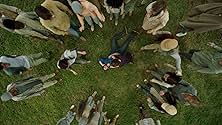After peaceful aliens invade Earth, humanity finds itself living in a utopia under the indirect rule of the aliens, but does this utopia come at a price?After peaceful aliens invade Earth, humanity finds itself living in a utopia under the indirect rule of the aliens, but does this utopia come at a price?After peaceful aliens invade Earth, humanity finds itself living in a utopia under the indirect rule of the aliens, but does this utopia come at a price?
- Awards
- 3 nominations
Browse episodes
Storyline
Did you know
- TriviaThe music heard on the Stormgrens' radio is all from the 1950s, the decade when the novel Childhoods End was published.
- ConnectionsFeatured in James Cameron's Story of Science Fiction: Alien Life (2018)
Featured review
I will try very hard not to spoil anyone's enjoyment of the first episode. (Incidentally, the introduction in the Kindle version of Childhood's end -- and probably the latest print edition as well -- includes a major spoiler, which is a criminal act. Should you buy the book, skip the introduction until AFTER you've read the book and/or seen the series.) As other people have said, the premise revolves around some apparently benevolent aliens who invade, declaring an end of war, hunger, climate change, hatred, and the other banes of 21st century society. Most people love the idea, but pockets of opposition rise up from people who feel threatened in one way or another.
The twists and turns in the plot are complex, complicated, and often subtle. The surprise is that the series manages them very well.
The script was quite remarkable, adapting the 60-year-old novel and weaving its complexities more deftly than I had expected. The romantic aspects were largely invented for the series. Like most of Clarke's science fiction contemporaries, 20-something "boys" in the science fiction world were geeks (we called them nerds) who had little understanding and less experience with "girls". Simple ignorance explains why they had so few strong women characters. The film version brings the story into the present and at least attempts to restore the balance.
Many factors worked against this film. The film is visual to some degree, but it is mostly dialog and atmosphere. For some of us, it was an amazing novel that raised some provocative questions and didn't answer them. For me, when I heard that someone was turning the long-loved book into a movie, I reacted with skepticism, uttering my mantra over such things. It would be good or it would be terrible. It was unlikely to fall anywhere in between.
I suspect it was a difficult film to sell to advertisers -- the lifeblood of the industry. There was a lot of mystery and adventure, but little or no pyrotechnics. It might not draw a sufficient audience to justify such ambitious projects. I noticed a large number of house ads and station promos in the breaks instead of paying commercials. To the credit of the producers, writers, and director, they didn't compromise the material to draw a bigger audience. As a result, the story takes time to unfold, and some audience members might not be patient enough to stick it out. But if you want to see a genuine attempt to put a seminal and unconventional novel on the home screen, give this a try. It isn't perfect, but it was well worth the effort -- and it's well worth your time.
The twists and turns in the plot are complex, complicated, and often subtle. The surprise is that the series manages them very well.
The script was quite remarkable, adapting the 60-year-old novel and weaving its complexities more deftly than I had expected. The romantic aspects were largely invented for the series. Like most of Clarke's science fiction contemporaries, 20-something "boys" in the science fiction world were geeks (we called them nerds) who had little understanding and less experience with "girls". Simple ignorance explains why they had so few strong women characters. The film version brings the story into the present and at least attempts to restore the balance.
Many factors worked against this film. The film is visual to some degree, but it is mostly dialog and atmosphere. For some of us, it was an amazing novel that raised some provocative questions and didn't answer them. For me, when I heard that someone was turning the long-loved book into a movie, I reacted with skepticism, uttering my mantra over such things. It would be good or it would be terrible. It was unlikely to fall anywhere in between.
I suspect it was a difficult film to sell to advertisers -- the lifeblood of the industry. There was a lot of mystery and adventure, but little or no pyrotechnics. It might not draw a sufficient audience to justify such ambitious projects. I noticed a large number of house ads and station promos in the breaks instead of paying commercials. To the credit of the producers, writers, and director, they didn't compromise the material to draw a bigger audience. As a result, the story takes time to unfold, and some audience members might not be patient enough to stick it out. But if you want to see a genuine attempt to put a seminal and unconventional novel on the home screen, give this a try. It isn't perfect, but it was well worth the effort -- and it's well worth your time.
Details
- Release date
- Country of origin
- Official site
- Language
- Also known as
- Кінець дитинства
- Filming locations
- See more company credits at IMDbPro
- Runtime1 hour 22 minutes
- Color
- Aspect ratio
- 16:9 HD
Contribute to this page
Suggest an edit or add missing content





































